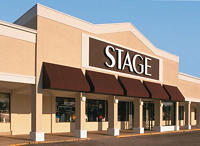Specialty department store retailer Stage Stores (SSI) has been suffering of late. After three straight disappointing earning reports, the stock is trading at a five-year low, and shares have plummeted more than 60% in the past year.
The company's biggest problem is two-fold. It operates in a struggling industry, department stores, and many of its stores are located in oil-rich parts of the country that are facing tough times with the oil bust. In its most recent quarter, the key holiday season, the company posted a profit of $0.91, down from $1.36 the previous year, and below expectations of $1.06. For the full year, earnings per share was just $0.51.
CEO Michael Glazer concisely summarized the company's key problems, saying:
"Our holiday results were pressured by low oil prices, the devalued peso and record warm temperatures. Stores in the oil patch and along the Mexican border account for more than 40% of our sales, and the economic uncertainty in those areas negatively affected our comp sales by 240 basis points during the fourth quarter."

Image source: Stage Stores.
Stage is not the only company to point to oil prices and currency exchange rates for driving down sales. Restoration Hardware (RH -3.28%) made a similar observation in its recent preliminary earnings report, saying that the "Canada, Texas, and Miami markets were a drag of 4 points" on revenues in the second half of the year. Chili's parent, Brinker International (EAT 0.58%), reported comps were down 2.1% in its most recent quarter, and the Dallas-based company said same-store sales plunged 6.6% in Texas, Louisiana, and Oklahoma, parts of the country that have significant exposure to oil prices.
Unfortunately for Stage, there's little it can do to alter those conditions, and they show no sign of changing in the foreseeable future. Similarly, overcoming weakness in the department store industry won't be easy, either. Last year, sales in that category fell 2.3% according to the Census Bureau, and a number of big names, including Macy's, Nordstrom, and Kohl's struggled, and many department store chains announced store closings.
Stage was among that group, saying last summer that it would close 90 of its 832 stores. The company plans to shut down 30 locations this year and will not open any. Instead it plans to invest in e-commerce and its omnichannel business and improve stores. One recent bright spot in its earnings report was 20% growth in e-commerce, but the company continues to expect headwinds in the current fiscal year, forecasting a decline in same-store sales of 1% to 3% and flat EPS growth.
Compounding the problem is Stage's generous capital return policy, which could be bleeding the company of cash it will need to turn around the business. Stage pays a quarterly dividend of $0.15, giving investors a dividend yield of 7%, but its payout ratio is 118%, meaning the current payout is unsustainable based on its current profits. Stage needs to dip into its cash reserves or borrow money to maintain the payout.
In addition, the company spent $41.6 million on share buybacks in the most recent quarter, more than double its net income for the entire year last year. During the past year, its debt burden grew from $45 million to $162 million, in part to help to help accommodate those buybacks. While Stage was able to reduce its shares outstanding by 20% with those repurchases, it could leave the company vulnerable to any potential downturn in performance.
Considering that the weakness in department store retail and low oil prices are likely to persist, Stage's performance is unlikely to improve, and the projected slide in same-store sales could only make the problem worse. Unless oil prices come roaring back, there seems little reason to bet on Stage's comeback.




